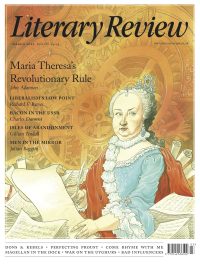David Armitage
The Long Road to Maastricht
The Pursuit of Europe: A History
By Anthony Pagden
Oxford University Press 417pp £25
The camera pans across the Alps. The place: the St Gotthard Pass. The time: the winter of 1871 – February, to be precise. Trim sleighs skim through the snows, each holding two bundled-up passengers. The travellers break their winter journey at an inn along the way, mingling over drinks before a warming fire. Two characters come into shot: a precocious German classicist, agonising about his academic future, and a charismatic elder statesman, forty years his senior and travelling incognito. The younger man will later proclaim the need to be a ‘good European’ by rising above the nationalisms of the age; the older is the era’s most gifted entrepreneur of nationalism. No one has yet made a film of this encounter between Friedrich Nietzsche and Giuseppe Mazzini. When they do, Anthony Pagden will be the ideal historical adviser.
This Alpine scene is one among a host of telling and aptly chosen vignettes in Pagden’s bold new book, The Pursuit of Europe. Pagden inclines more towards Nietzsche’s approach than Mazzini’s. Erudite and polyglot, raised in Chile and educated in Spain and at Oxford, he is a citizen of the world and has had a distinguished academic career on both sides of the Atlantic. From his current perch in Los Angeles, he surveys Europe from a sceptical distance and with deep, affectionate familiarity. His many works have traced the fate of empires, the consequences of encounters, the clash of ‘civilisations’ and the enduring importance of the Enlightenment, among other topics. Readers of Pagden’s earlier books will recognise in The Pursuit of Europe the characteristic grand sweeps, sparkling prose and mission to use the past to shed light on the present. They will also find a blind spot that clouds his cosmopolitanism.
The Pursuit of Europe tells the ‘story of an ambition, of a dream, of, some would say, an illusion’. That ambitious or illusory dream is the vision of Europe as a community above nations, what Edward Gibbon in that fateful year 1776 called ‘a great republic’. The book analyses

Sign Up to our newsletter
Receive free articles, highlights from the archive, news, details of prizes, and much more.@Lit_Review
Follow Literary Review on Twitter
Twitter Feed
The era of dollar dominance might be coming to an end. But if not the dollar, which currency will be the backbone of the global economic system?
@HowardJDavies weighs up the alternatives.
Howard Davies - Greenbacks Down, First Editions Up
Howard Davies: Greenbacks Down, First Editions Up - Our Dollar, Your Problem: An Insider’s View of Seven Turbulent...
literaryreview.co.uk
Johannes Gutenberg cut corners at every turn when putting together his bible. How, then, did his creation achieve such renown?
@JosephHone_ investigates.
Joseph Hone - Start the Presses!
Joseph Hone: Start the Presses! - Johannes Gutenberg: A Biography in Books by Eric Marshall White
literaryreview.co.uk
Convinced of her own brilliance, Gertrude Stein wished to be ‘as popular as Gilbert and Sullivan’ and laboured tirelessly to ensure that her celebrity would outlive her.
@sophieolive examines the real Stein.
Sophie Oliver - The Once & Future Genius
Sophie Oliver: The Once & Future Genius - Gertrude Stein: An Afterlife by Francesca Wade
literaryreview.co.uk